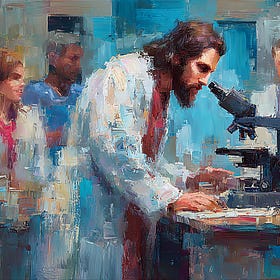God does not send us data. He gives Himself.
Part I — God makes Himself known.
God gives Himself to be known. And it’s personal. Really personal.
That statement1 is a theological earthquake.
It means God is not a passive object that we can, through observation, reason, and some effort, come to know as we would any other object. He is not known in these ways. He cannot be known in these ways. He cannot be known in the ways that make sense for coming to know created objects. He is not a created object. To know Him, He must act to make Himself known to us.2 And He has done so
Diana Markosian3 grew up with almost no living contact with her dad after her mother moved her and her brother from Moscow to the U.S. Years later, she went searching for her father. And she found him in Armenia.
She flew to Armenia with almost nothing of him. She had some cropped family pictures, scraps of memory, a name, a city, the memory of a hallway, a door. She raised her hand and knocked. “I knocked on the door of a stranger. I’ve traveled halfway around the world to meet my father.”
He opened the door. And for a breath, he stood in its frame, neither inside nor outside. The distance of years gathered in a doorway. “All these years later, I found my father standing just how I left him. In a doorway, neither fully in or out of my life.”
He set a suitcase on the table. It was filled with newspaper clippings, returned letters, a shirt saved for her brother’s wedding, “…items my grandfather put aside in hopes of meeting us one day.” Their family had written hundreds of letters, searching across an ocean for the children who were gone.
They sat there. Just sat there. A loud clock was heard in the silence of the room. She asked about the letters. And he answered with something other than information. “I don’t want there to be pain. I want there to be love.”
In that moment, all the letters, the clippings, the fragments, the scraps of memory, they didn’t vanish; they took their proper place. Facts remained facts, but presence becomes the point. Knowledge changed its shape. It changed from about, to with. It changed from artifact-curation, to communion. It changed from collating photo fragments, to shared life. The room shifted. Diana is addressed. She is claimed. The door that guarded an archive opens to a life. He did not send another letter; he became present.
Knowing God begins with His self-giving.
When God took action to make Himself known, He did not give us information about Himself. He gave us Himself. He didn’t give us abstract philosophical ideas. He didn’t give us a theological system.4 He didn’t remain at a safe distance, so that we could make detached observations. Ideas and systems and observations are not self-giving. He is. All our attempts at speaking of God like we know Him, apart from His self-giving disclosure, are inevitably distorted. They are misshapen by minds unhealed and concepts unfit for bearing the weight of divine reality.
Abstract ideas, theological systems, detached observations… these all originate with us. They sound like this. “God is the First Cause of the universe” (an abstract idea). “God’s primary attribute is absolute sovereignty, therefore…” (a tidy theological system built on logical inference). “Jesus was a wise moral teacher who spoke some rather profound ethical truths” (a detached observation).
If we want to know something of God—really know something—we can’t start with abstract ideas, theological systems, or detached observations. We can’t analyze our way to Him. We can’t climb up toward God by thinking harder or seeing further. These things are not wrong because they are false. They are wrong because they are empty. He is not known in them. He is known only in Himself.
We can’t know God through abstraction, systems, or detached observation.
God is not known in metaphysical principles or abstract ideas. He is the Triune God who steps into a life-altering, mind-blowing, self-giving, world-reordering, deeply personal relationship (a covenant) with us.5 He stepped into history. He stepped into Incarnation. He steps into communion. He gives Himself.
His self-revelation takes place in history, not in our minds.6 A “First Cause” can be conceived without knowing Abraham, Israel, or Jesus Christ. But He is not merely the explanation behind existence; He is the God who becomes known through the personal event of His own self-giving. He gives His own being, in Jesus Christ, into relationship with us. He does not reveal a truth about Himself; He reveals Himself.
God is not known in theological systems and philosophical extrapolations. A single divine attribute can be extrapolated through philosophical deduction into a massive, multi-volume systematic theology. And it could be true, and mind-bending, and profoundly interesting. But the true nature of God’s <insert any divine attribute here, e.g., sovereignty> is not revealed abstractly; it is revealed in the Incarnation, where his sovereign love takes the form of humility, condescension, and suffering, places where our extrapolated philosophical deduction is not likely to lead us.7
Coherent constructs and philosophical deductions are helpful, but they are not personal knowing. Mental mastery is not communion with God. And communion with God is the only way to come to know the God who is Himself a communion of love. It is the only way He has given us to know Him.8
If He were a created object, or thing, or force, then we’d come to know Him as we do every other object, or thing, or force. But He is none of those. He is uncreated. He is wholly other. He is a communion of divine relational love of Father, Son, and Spirit.9
This is why knowing Him—really knowing Him—has an impact, as only true divine love can. There is no knowing Him apart from being impacted by Him, impacted by His love. He heals. He restores. He comforts. He convicts. He reshapes. He renews. He lifts burdens. He quiets fear. He indwells. Every act of true knowing, every act of his self-revelation, brings with it a movement of grace. With God, to reveal Himself is to be reconciled with Him. It is to be impacted by His love. There is no revelation without reconciliation. With God, revelation is reconciliation.10
In a North Carolina veterans court, an Army Special Forces veteran with severe PTSD, Joe Serna, stood before Judge Lou Olivera.11 The probation file is open. The facts are clear. The violation is real. The sentence is spoken: one night in jail. Justice is not dodged. It is named.
And yet there is a gap that remains.
Olivera knows what a night in a small cell will do to a man whose traumatic memories close in on him. So he stepped off the bench. He drove Joe to the jail. He walked inside. The jailer hesitated, “I don’t know what you’re thinking, son. I can’t lock up a judge.” Olivera insists, and the door closes on both.
They sit on steel bunks and talk like men who are more than their papers. They talk about family, about fear, about what won’t let go when the lights are off. The sentence stands. But the isolation does not. The judge does not erase the judgment; he bears with Joe what the judgment cannot heal.
Then something changed. Joe’s “knowledge of the judge” shifts from role, to person, from distance, to communion. The truth was spoken in court, but peace was made in the cell. The file, the data, the information, the findings is still true, but it is no longer the point; it becomes a witness to a greater act. Revelation—who the judge truly is—arrives as self-giving presence, and that presence resulted in reconciliation.
God is not known through detached scientific or historical analysis. Jesus Christ was a real historical human being. So yes, we can make Him an object of analysis. We can study Him, examine His life, ethics, and influence, and agree on facts about Him. But whatever those detached observations would be for us, we would not be caught up in who He really is (any more than knowing facts about a person would be a friendship with that person).
We would not be sharing in His life. We would not be drawn into His relationship with the Father. Which is precisely how God makes Himself known and enables us to have communion with Him, a communion we are drawn into by the power of His Spirit when He reveals Himself.12 A neutral evaluation of Jesus won’t land us at the feet of the incarnate self-revelation of God. It won’t personally claim us as only He can.13
God chose another way: He revealed Himself in Jesus Christ.
So, instead of ideas, observations, and systems of our own making, all falling laughably short of knowing anything of a wholly other infinite God, God chose another way. He chose to act toward us. He chose to reveal Himself in Jesus Christ. He gave Himself to be known.
At Creation, God formed the human mind with an ability to know Him. We were made for communion with Him. The knowing of anything we might come to know takes shape in our minds, the place He created for relational knowing, and for truth, and for communion, and yet a place now irreparably broken by sin. That place within us, designed for knowing Him, has become fractured. Our very ability to recognize what is true has been distorted.14
And right there is the difficulty: for God to make Himself known, our minds must be healed to hear Him, to see Him, to recognize Him, truly Him, not the Frankenstein gods of our assembled broken ideas and observations, which will inevitably be reflections of ourselves and self-affirming gods of our own making.
So if God is to reveal Himself, He must also restore the very faculties by which we can hear and understand. He must reconstruct our knowing from the inside out. And this is precisely what he set out to do.
Anne Sullivan led Helen Keller to the water pump. Helen has lived, until now, without words. She has lived years inside a closed room of touch and taste and force and soundless night. People have only ever guessed at her, labeling what they can’t understand.
Anne took Helen’s hand and put it under the spout. Cold water ran across Helen’s skin. With the other hand, Anne spells it again, slowly, then quickly: W—A—T—E—R. Months of drills. Years of silence. Motions spelled out on Helen’s hand that felt like nothing more than motions.
The stream or water keeps coming, and then the letters land.
Helen’s face suddenly changes. She lets the cup fall. She reaches for the ground and asks for its name. Then for the door. Then for Anne’s dress. The yard becomes a lexicon. By nightfall, the world is naming itself back—thirty words and a life waking to meaning.
Later, in her autobiography, Helen will say it like this: “Suddenly… the mystery of language was revealed to me. I knew then that W—A—T—E—R meant the wonderful, cool something that was flowing over my hand. That one living word awakened my soul, gave it light, hope, joy, and set it free!”
In that moment, at the water pump, all the motions “clicked” and all the drills were turned into understanding.15
Anne Sullivan’s slow method of rules and finger-spelling had gone on and on without obvious payoff. But all the drills weren’t busywork. They assumed meaning would dawn from within. They were helping Helen recognize the real thing when it arrived. After the breakthrough, those same signs—those motions felt in her hand—became carriers of meaning. And all the practice and drills were reinterpreted as preparation.
God heals our knowing and forms us to recognize His Son.
Knowing unfolds slowly, like light dawning over time. In our minds, in that damaged inner terrain, God began to re-form the right concepts: the shapes of thought that can hold His self-revealing presence. These shapes—ideas like holiness, mercy, sacrifice, forgiveness, atonement—don’t just drop into our heads. They are shaped in history, across generations, through covenants and prophets, through the liturgies of worship, the structures of the Law, the patterns of sacrifice, the festivals and feasts, the psalms and priesthood. All of these become the enacted signs and rhythms through which God formed a people to bear, receive, and one day recognize His self-revealing presence in Christ.16
For us to know God as He truly is, He had to build in us the capacity to know Him. And so He began. He began personally, historically with Abraham. From there, He patiently constructed a 2,000-year history that would lead, at just the right time, in the fullness of time, to the Incarnation, to the complete self-revelation that we might see and understand.17
Apart from that patient, painfully hard, brutally loving, constantly self-giving, self-revealing, self-emptying, self-humbling, self-communicating, self-binding 2000-year history, we’d have no frame of mind, no frame of speech, no framework to understand grace, mercy, truth, holiness, Messiah, Savior, Prophet, Priest, King, Father, Son, Servant, covenant, presence, sacrifice, forgiveness, reconciliation, redemption, atonement, worship… and in the end, without any understanding of these things, we’d miss Jesus Christ entirely. We’d miss God’s perfect, complete, and full self-expression.18
All true knowledge of God is Jesus-shaped.
There is no knowledge of God apart from the Incarnation. There is no general, detached “idea of God” to grasp. All true knowledge of God is Jesus-shaped. There is no God behind Jesus Christ. God has revealed Himself in such a way that we may know Him only through Himself in the person of Christ.19
In Christ, God fully and finally gives Himself to be known. In Christ, God is fully revealed.20
What will follow is the story of that movement. What will follow is how God made Himself knowable.
You’re reading Part 1 in a series about how God makes Himself knowable. In the weeks ahead, we’ll walk the road He actually took, not the road in our heads, but into real history. We’ll move from “God is not one more thing among things” to a promise in Abraham’s tent, through temple smoke and prophets’ fire, the ache of exile and the hard school of wisdom, all the way to a manger, a cross, an empty tomb, and the wind of Pentecost that gathers a people around a table.
Next up, Part 2: why we can’t climb to God with ideas, and why only His own move toward us—His mediation—opens the way. Come with me.
Revelation is personal and filial; God gives Himself in the Son. John 1:14, 18 — The Word became flesh … the Son has made the Father known. Hebrews 1:1–3 — God spoke by the Son; the Son is the exact imprint. John 14:9 – “Whoever has seen me has seen the Father.” 1 John 4:9–10 — God showed His love by sending His Son.
Knowledge of God is God’s sovereign initiative. Matthew 11:27 — Only the Son reveals the Father. John 6:44 — “No one can come … unless the Father draws him.” Isaiah 65:1 / Romans 10:20 — “I revealed myself to those who did not ask.”
Revelation contradicts our religious rationalisms. Not ideas or systems; worldly ‘wisdom’ can’t deliver God. 1 Corinthians 1:21–25; 2:1–5 — God through the folly of the cross, not human wisdom. Colossians 2:8–9 — Beware empty philosophy; the fullness of Deity dwells in Christ.
Personal, covenantal self-binding is the mode of divine self-revelation. Genesis 17:7; Exodus 6:7 — “I will be your God, you my people.” Jeremiah 31:31–34; Luke 22:20 —New covenant in Christ’s blood.
Revelation happens in history, not abstractions. Hebrews 1:1–2 — “At many times … now in the Son.” Luke 1:68–75 — God acts in historical mercy. Acts 2:22–24 — God’s mighty works in Jesus.
Divine attributes are known in the Incarnation, above all in the Cross. God’s “sovereignty” is Jesus-shaped. Philippians 2:5–11 — Humbling is what divine majesty looks like. John 13:3–5 — Sovereign Jesus washes feet. 1 Corinthians 1:23–24 — The crucified Christ is God’s power and wisdom.
Communion, not mental mastery. To know God is to share His life. John 17:3 — Eternal life is knowing the Father and Son. 1 John 1:3 — Fellowship with the Father and His Son. 2 Corinthians 13:14 — Communion of the Holy Spirit.
He is uncreated, wholly other; God is triune communion. Exodus 3:14 — “I AM WHO I AM.” Isaiah 40:18 — To whom will you liken God? John 1:1–2; 17:24 — Father–Son communion from eternity.
Revelation is reconciliation—knowing Him changes us. 2 Corinthians 5:18–19 — God reconciling the world in Christ. Colossians 1:20–22 — Peace by the blood; we are presented holy. John 14:23 — Father and Son make their home in us. 2 Corinthians 3:18 — Beholding → transformed.
Epistemology is pneumatology. The Spirit draws us into the Son’s communion with the Father. John 14:26; 15:26; 16:13–15 — The Spirit takes what is Christ’s and declares it to us. Romans 8:15–16 — The Spirit cries “Abba.” 1 Corinthians 12:3 — Only by the Spirit: “Jesus is Lord.”
Detached analysis of Jesus can’t yield communion. John 5:39–40 — You search Scriptures but won’t come to me. 1 Corinthians 2:14 — The natural person cannot receive the things of the Spirit. Luke 24:16, 31 — Eyes opened by Christ/Spirit, not by data alone.
Our minds are broken; God must heal and re-form them. Romans 1:21; Ephesians 4:17–18 — Futile/darkened understanding. 2 Corinthians 4:4, 6 — God shines into our hearts with the knowledge of His glory in the face of Jesus. Luke 24:45 — He opened their minds to understand the Scriptures.
Israel’s long history forms the grammar to recognize Christ. Luke 24:27, 44–45 — Moses and Prophets concerning Him; minds opened. Galatians 3:24 — The Law as paidagōgos unto Christ. Romans 3:1–2; 9:4–5 — Israel’s oracles, adoption, covenants, promises. Colossians 2:17; Hebrews 8–10 — Shadows fulfilled in Christ.
He began with Abraham; ‘fullness of time’ in Christ. Genesis 12:1–3; 15 —– Promise and covenant with Abram. Galatians 3:8, 16 — Gospel pre-announced to Abraham; seed = Christ. Galatians 4:4 — In the fullness of time, God sent His Son.
Christ is intelligible only within Israel’s God-authored history. John 5:46 — “Moses wrote of me.” Acts 13:32–33 — Promises fulfilled in Christ. Romans 11:17–24 — We’re grafted into Israel’s story.
There is no God behind the back of Jesus Christ. John 1:14; 1 John 1:1–3 — Word became flesh; seen, heard, touched. John 14:9–10 — To see Jesus is to see the Father. Colossians 1:15, 19; 2:9 — Image of the invisible God; fullness in Him. Hebrews 1:3 — Radiance and exact imprint.
Finality and fullness of revelation in the person of the Son. Hebrews 1:1–3 — Climactic speech in the Son. John 17:6, 26 — Jesus makes the Father’s name known. 1 John 5:20 — The Son has come and given us understanding.







Wow! So good!